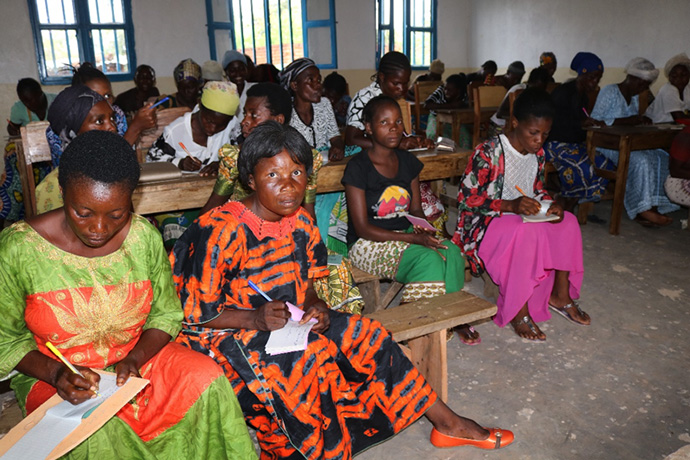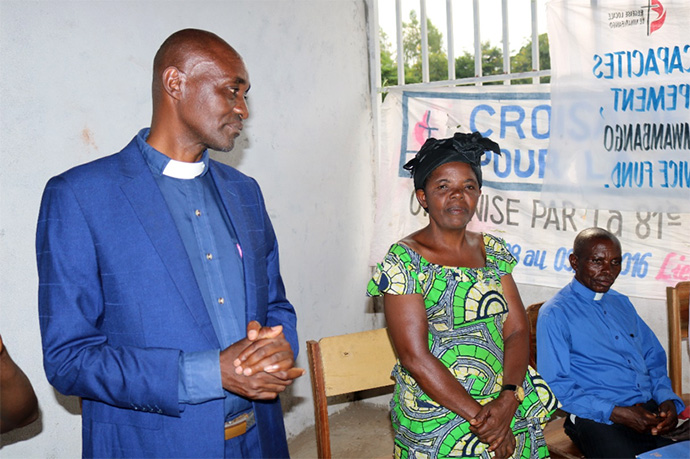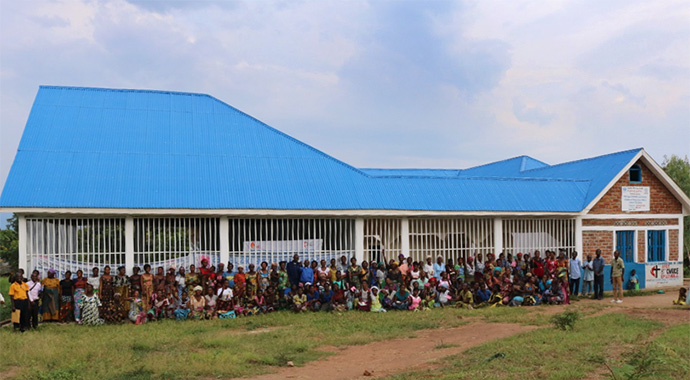
The United Methodist Church in East Congo has collaborated with the Congolese government to open a vocational training center for women and youth in Fizi District.
Bishop Gabriel Yemba Unda said he sought out the partnership to help the faithful in his episcopal area provide a better life for themselves — many of whom are women who cannot read or write or are victims of sexual violence.
More than 100 women and 50 youth currently are receiving weekly training at the center.
The church conducts the professional training with volunteers and donated materials. The money to construct Maendeleo Center came from the United Nations Organization Stabilization Mission in the Democratic Republic of the Congo.
The Rev. Kabaiza Hatari, Fizi District superintendent, said most of the women are widows, rape survivors or others who were unable to get an education.
“The types of training that we currently offer are literacy, cutting and sewing, pastry (making) and a soap factory.”
He said other professional training will be added gradually as they find partners to provide the needed equipment.
“This center has just relieved not only the women who start some training and apprenticeship but also the whole population of Fizi,” Hatari said.

Mathieu Bahindula, who leads classes on entrepreneurship at the vocational training center, said students are guided in different trades, starting with a pretest at registration to determine their level of study and proficiencies. After that, students are invited for an oral interview to help determine their choice of training, he said.
Lea Abwe, who is in charge of the center, said the courses were chosen based on the materials they had on hand or that had been donated.
“This (training) will help women find their place in society and (take care of themselves), which is a necessity of the moment,” she said.
Helene Bataku, a member of Mwambangu United Methodist Church in Fizi, said the center offers women new opportunities and a chance to catch up to their peers.
“We, the women of Mwambangu village, are always late compared to the women who are connected. I thank the local church for this training, because the women who do their training in this center will be able to measure themselves one day with the other women,” she said.
Justine Amunazo, who lives in Fizi and is taking classes, also thanked The United Methodist Church for its work
“I did not complete my primary studies and I did not know (what kind of) job (I could find) to allow me to live. Sometimes, I was confused (compared to) other women who are connected in the world. Today, I start to write and read correctly,” she said.
Adele Nyota Mazambe, a widow, said the center has helped build her confidence.
“I am starting to write and read — something that gives me much more value,” she said.

Victorine Ngalima, a victim of sexual violence in the highlands of Minembwe, said she has been outcast in her community. For her, the vocational training is life changing.
“Today, I am starting to take care of myself with the training I received. I’ve started to make and sell soaps and I start to find myself useful in front of other people,” she said.
Dr. Marie Claire Manafundu, head of the Mama Lynn Center, a sanctuary for Congolese rape survivors in Kindu, said several activities of this kind are taking place to encourage the women of Fizi. Some of the women from Mama Lynn are taking part in the vocational training.
Manafundu, the bishop’s wife, said she hopes to be able to equip the Maendeleo Center in Fizi with materials, “so that these women become more and more useful in the society.”
Unda said it his duty to lift up the marginalized and to help them find a pathway to success.
“Like a shepherd, I have the obligation to conduct this kind of pleadings, because a good shepherd is one who also knows the material and spiritual needs of these faithful,” he said.
Kituka Lolonga is a communicator in the Kivu Conference.
News media contact: Vicki Brown, news editor, newsdesk@umcom.org or 615-742-5469. To read more United Methodist news, subscribe to the free Daily or Weekly Digests.
Like what you're reading? Support the ministry of UM News! Your support ensures the latest denominational news, dynamic stories and informative articles will continue to connect our global community. Make a tax-deductible donation at ResourceUMC.org/GiveUMCom.



